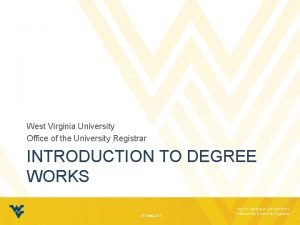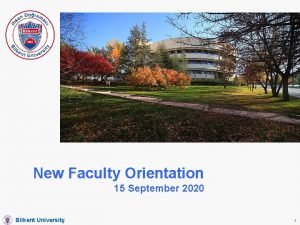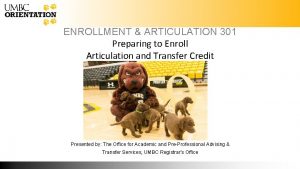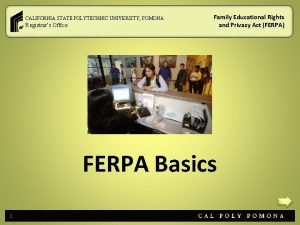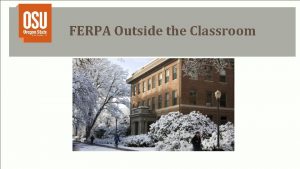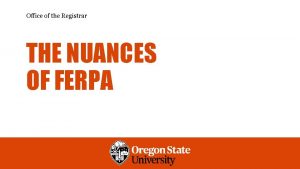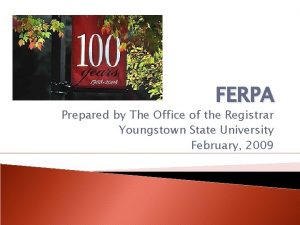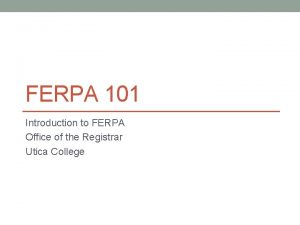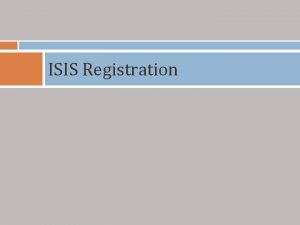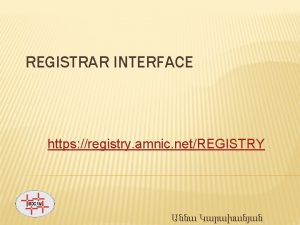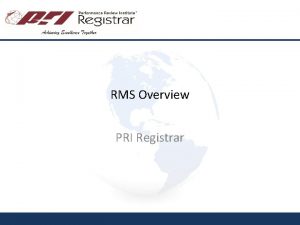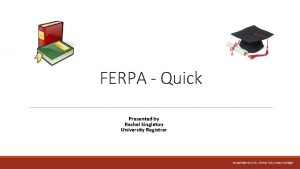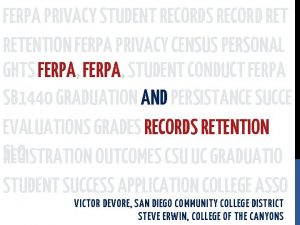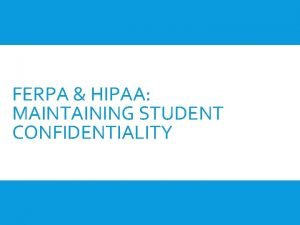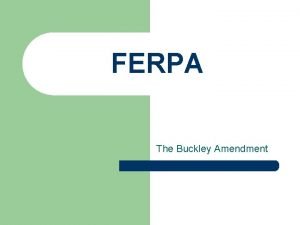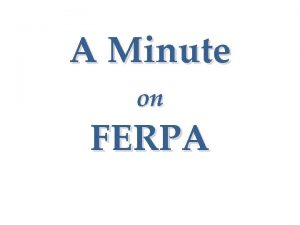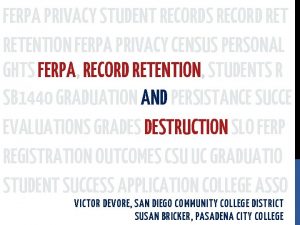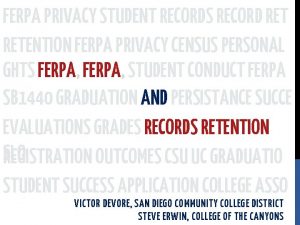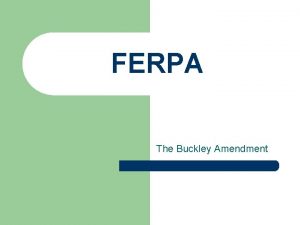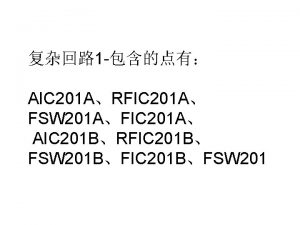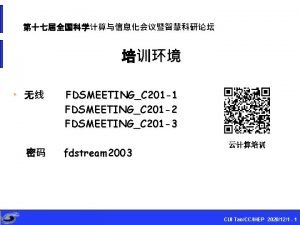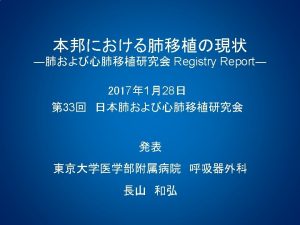FERPA 201 Comprehensive FERPA Office of the Registrar





































- Slides: 37

FERPA 201 Comprehensive FERPA Office of the Registrar Utica College

What is FERPA? � The Family Educational Rights and Privacy Act of 1974 (FERPA), as amended, sets forth requirements regarding the privacy of student records. � FERPA applies to any educational agency or institution that receives funds under a program administered by the Secretary of Education. Utica College receives these funds in the form of federal financial aid disbursed to students.

Different FERPA Practices � FERPA requires each institution to establish its own criteria for certain terms and practices; consequently, FERPA will be implemented differently at different schools. � Some of the policies and procedures included in this training are specific to Utica College.

Who is protected under FERPA? � FERPA protects the education records of any student who has ever enrolled at Utica College. � This definition includes classes taken: � on or off campus � online � hybrid � for credit or audit, CEU, or non-credit � degree-seeking students � non-degree-seeking students � through an affiliate and recorded on the Utica College transcript

Check Your Understanding Whose record is confidential and protected by FERPA? a) A current Utica College student b) An alum who got a UC degree in the 1950 s c) A community member who audited a nonmatriculated class at UC in the 1990 s just for fun d) An applicant who has applied to a degree program but has never taken a class Answers (a), (b), and (c) are correct. FERPA applies to anyone who has ever taken a class at UC, even if it was a long time ago or a non-graded course. Answer (d) is incorrect because an applicant has never taken a class at UC.

What does FERPA require us to do? � Keep student records confidential by ensuring that: � Only school officials with legitimate educational interest have access to students’ educational records. � School officials do not disclose information without students’ written permission, except under certain exceptions (e. g. , subpoena). � Allow students to inspect, and when incorrect, to amend their education records. � Notify students of these rights annually. UC does this by way of a link on the password reset page.

Who is a school official? � Any employee or agent of the College is a school official. � This definition includes: � All staff (full- or part-time) � Full time faculty � Adjunct faculty � Student workers and interns � On-call employees � Temporary employees � Volunteers � Employees at all partner agencies

Check Your Understanding Which of the following is a school official? a) b) c) d) e) f) g) h) i) j) k) l) A student worker in the bookstore A member of the housekeeping staff The spouse of a student A UC accountant The President of the College An employee at ENGAGE A faculty member The student’s parent A student intern in a campus office A member of the Board of Trustees A temporary worker in Student Financial Services A Success Coach All answers are correct except (c) and (h). A school official is any employee or agent of the College including, but not limited to: faculty, staff, volunteers, interns, alumni mentors, student workers, and the Board of Trustees.

What are education records? � An education record is any record directly related to a student and maintained by the College or by any party acting for the College. � Education records may be in any medium including, but not limited to: handwriting, print, and computer media (e. g. , electronic databases, learning management systems, and email). � FERPA protects the education records of any student who has ever enrolled at Utica College.

Check Your Understanding Which of the following is an education record? a) An email about a student sent from an adviser to Student Financial Services b) A student’s schedule displayed on a computer monitor c) A class list/roster d) A student’s grades e) The semester’s Schedule of Courses f) A student’s phone number, which s/he has written down and handed to a classmate Answers (a), (b), (c), and (d) are correct. These are records that are directly related to students and maintained by the College. Answer (e) is incorrect because the Schedule of Courses does not contain information about specific students. Answer (f) is incorrect because the record was neither created nor maintained by the College.

Sole Possession Records � Sole possession records – “scratch” notes that someone creates by themselves for their own personal use – are NOT considered educational records. � Any note you create in cooperation with another person or put in a location accessible to others (including in a shared electronic environment) is NOT a sole possession record. It is therefore an education record that the student has a right to inspect. � If it’s not a sole possession record, the student has a right to see it. Keep comments professional and appropriate.

Check Your Understanding Which of the following is a sole possession record (therefore NOT part of the education record)? a) A sticky note with a student’s name, phone number, and a concern they asked you about, placed by your phone in your private office b) A sticky note with a student’s name, phone number, and a concern they asked you about, placed in an advising file that is accessible to anyone in your Department c) An email from an instructor to a department Chair about a student d) Notes about comments made by specific students during a class discussion, stored on an instructor’s personal laptop e) A grade improvement action plan, co-created by an instructor andarea correct, student Answers (a) and (d) assuming these records will not be shared with anyone else. Answers (b) and (c) are incorrect because notes can be read by more than one person. Answer (e) is incorrect because the record was created in cooperation with another person.

What is a ‘legitimate educational interest’? �A school official has a legitimate educational interest in accessing or reviewing a specific education record if the school official is: � Performing a task that is specified in his or her position description or contract; � Performing a task related to a student’s education or to student discipline; � Providing a service or benefit related to the student or student’s family (e. g. , job placement, health insurance); or � Maintaining safety and security on campus. �A school official may desire to see part of a student’s record, but this does not mean that s/he has a legitimate education interest or should be granted access.

Check Your Understanding Which of the following constitutes legitimate educational interest? a) An instructor emails the Dean of Students with concerns about a student. b) A staff member heard that a student is ill and wants to mail her a card. He looks up her address in the student information system (Banner) c) An instructor with concerns about a student’s writing ability shares those concerns with the student’s adviser. d) An instructor with concerns about a student’s writing ability asks the student’s adviser how the student is doing in his other class. e) The Office of Parent and Alumni Relations wants contact information so they can invite certain graduates to speak at an alumni event f) An instructor conducting research for her doctoral dissertation wants contact information for students who have taken her classes in the past g) A father wants to know why his son was dismissed Answers (a), (c), and (e) are correct. Answers (b) and (f) are incorrect because the information is not needed for the employees to do their jobs at Utica College. Answer (d) is incorrect because the instructor has a legitimate educational interest only in regards to his/her own class. Answer (g) is incorrect, because a parent’s interest is personal, not educational.

Directory Information � Under FERPA, some student information, called “Directory Information, ” may appear in public documents and may be disclosed to any person or entity without student consent. � Each institution chooses which information will be categorized as directory information; therefore, directory information differs between schools. � Directory information at Utica College is likely to be different from other colleges and universities.

Directory Information at Utica College At Utica College, directory information includes: � Student's Name � Local Address/Campus Residence/Telephone Numbers � Permanent Address/Telephone Number � E-mail Address � Date and Place of Birth � Hometown � Degrees and Awards Received and Dates � Dates of Attendance (Current and Past) � Full or Part-time Enrollment Status � Participation in Officially Recognized Activities � Participation in Officially Recognized Sports NOTE that Banner ID# and � Weight/Height of Members of Athletic Teams academic adviser are NOT � Most Recently Attended Educational Institution listed as directory information. � Major Field of Study If a student does not know � Academic Levels his/her ID# or adviser, this � Residency Status information is available to � Photographs him/her via Banner. Web. Source: http: //www. utica. edu/academic/registrar/ferpa. cfm

Confidential Records � Students, faculty, and staff have the right to put a confidentiality block on their records. This restricts the release of even the most basic directory information. Students: Contact the Office of the Registrar � Faculty and Staff: Contact the Office of Human Resources � � If an individual has blocked access to his/her directory information, the only answer to any request for information is: “We have no records on that individual. ” � There are only two ways you may release any information on such an individual: 1. 2. A signed release from the student The student is before you, showing legal (photo) identification

How do you know if a record is confidential? � In Banner. Web, you will see the following : (don’t worry – Reggie Trax isn’t a real person, he’s the College Mascot) � In Native Banner, when you enter the student’s name or ID#, you will receive the following error message: You never know why an individual has placed a confidentiality block on his/her account. They may have been the victim of domestic abuse. They may have been the victim of identity theft. While it may be inconvenient, if you are actually dealing with the student, they should appreciate your awareness and willingness to honor their request.

Check Your Understanding Your advisee is calling you during office hours, asking for feedback about her midterm performance. She gives you her Banner ID#, and you pull up her records in Banner. Web. The record states that it is confidential. You… a) Ask the caller to confirm the student’s address and date of birth. Since the caller knows these items, you proceed with the conversation. b) Ask the individual on the phone to come in for an inperson advising appointment c) Inform the person that you are sorry, but you are unable to help. d) Offer to send an email to the student’s UC email Answeraccount. (c) is the only correct answer. Answer (a) is incorrect because in attempting to verify identity, you have violated the student’s request to restrict all access to her records. Answers (b) and (d) are incorrect because by asking her to come in to an appointment or offering to send an email, you have verified that she is a student at UC.

What to do after telling your advisee that you can’t help her… It will be difficult to tell someone that you can’t help them. After telling the person on the phone that you are sorry, but you cannot help her, you may choose to send an email to the student’s valid Utica College email account that explains: 1. That you were on the phone with someone claiming to be her (if it wasn’t her, she should know!) 2. That you honored her request to not disclose any information 3. That you will be happy to speak with her at your next office hours, or that you can arrange a time for her to call, so you may be sure of her identity when she calls. If you have a student who has a confidentiality block, you may want to set up a password each semester so you may be certain of his/her identity if/when s/he makes an unscheduled call. As with any password, it is safest if it is updated fairly regularly.

More About Directory Information: “May, ” vs. “Must” You may release directory information, but FERPA does not require institutions or their employees to disclose any part of the educational record to any party except the student. � Utica College reserves the right to refuse to release directory information to any person or entity, other than the student, at any time. � Any school official who has concerns about a request for directory information should decline to provide the information and consult with the Office of the Registrar. � Only the student has the unrestricted right to access his/her educational record, and s/he has the burden of proving identity before any release may be made.

Check Your Understanding You get a phone call from a woman asking for a student’s address and phone number. When you explain that you cannot give out that information, she says, “Well, give me whatever information you can. ” You should: a) Give her all of the unrestricted directory information you have about the student b) Ask her what specific information she needs and why c) Refer her to the Office of the Registrar d) Tell her that we reserve the right to refuse to give information to anyone and hang up Answer (c) is correct. We may release directory information, but we are never required to. If a request sets off your “spidey sense, ” refer the caller to the Office of the Registrar.

How can I make sure I’m complying with FERPA? 1. 2. 3. Access only records you need. Handle student information in a secure way. Release information only as needed – even with coworkers.

Access only records you need: � Having access to student information does not give you the unrestricted right to view that information. � Only access what you need to do your job. � Avoid reading records that may be lying on other people’s desks or pulled up on their computers.

Handle student information in a secure way: � You are responsible for making sure that student data in your possession is secure and protected from unauthorized access: Do not leave protected student records on copy machines, in classrooms, or pulled up on your computer screen when you leave your work area � Do not leave protected student records laying face up on your desk where others can see it. � Shred (rather than recycle) printed material that contains sensitive or restricted data. � � Restrict access to protected student information stored on a computer. If you share a computer (at work or at home), password-protect any student information. � Keep discs, laptops, and thumb drives in a secure location. � LOCK your computer when you walk away from it. �

Check Your Understanding You find a printout of a student’s course schedule on a desk in an empty classroom. You should: a) Leave it where it is, in case the student needs it and comes back, looking for it. b) Pick it up and shred it. c) Give it to the Office of the Registrar. d) Think “green” – grab it and use the back side for scratch paper! Answers (b) and (c) are both acceptable. If you are unsure whether the document is easily replaceable, give it to the Office of the Registrar so they can contact the student if needed.

Releasing Information: To Colleagues Share student information with other school officials: � Only if they have a legitimate educational interest in that particular/specific information. � Desire for access to information is not necessarily a legitimate interest as defined by FERPA. � By phone only if you are sure who you talking to. � By email only to the student’s Utica College e-mail account. CAUTION: Keep in mind that email is vulnerable to accidental misdirection by the sender (e. g. , a moment of inattention could direct an email to the wrong person).

Releasing Information: To the Student (Most secure methods) Share protected information with students: � Online behind a secure login (in Utica College e-mail, Engage, or Canvas) � In person (with photo ID if the student is unknown to you) � On paper, mailed to the address on file in Banner � NOTE: mailing to another address or sending anything to any fax number requires the signed permission of the student. Contact the Office of the Registrar for more information. Remember: Security is an issue only for FERPAprotected (student-specific) information. If someone has questions about general information that is non-studentspecific, such as College policy/procedure, class assignments/syllabi, etc. , it may be released in any medium.

Releasing Information: To the Student (Other methods) � By phone, only after using “reasonable methods” to authenticate identity: � Recognize their voice � Arrange the phone call ahead of time via a secure environment, such as UC email or Engage � Ask three questions that only the student is likely to know � CAUTION: Do NOT ask for social security number or date of birth to authenticate identity, because confirming a correct guess can provide information to identity thieves. � By email, only to the student’s UC email address listed in Banner.

Check Your Understanding A student wants to discuss his progress in your class. Which of the following are acceptable ways to discuss the information with him? a) Through Engage email b) In person, after class c) On the phone at a time arranged during class d) In response to an unplanned phone call, as long as you can verify that you are speaking with the student e) To a “hotmail” email address (_____@hotmail. com) f) To a “gmail” email address (_____@gmail. com) that lists the student’s name as the recipient Answers (a), (b), (c), and (d) are correct. Answers (e) and (f) are incorrect because you have no way of knowing if it was really the student who emailed and who will receive the answer. It’s all too easy to set up an unsecured email account and list any name you wish on the account.

Releasing Information: To a Third Party A “Third Party” is any person or entity who is not the student. This could be a parent, an employer, a spouse, etc. � Release information to a third party only with the written consent of the student. � If a third party is requesting information, DO NOT release confidential student information. � Student Financial Services has implemented a password system to allow parents of dependent students to discuss their child’s financial accounts. This is one exception to this rule, as the password is set up in cooperation of the student and in compliance with FERPA. This password only applies to the student’s financial account. Contact the Office of the Registrar for assistance or if you have questions.

Check Your Understanding A uniformed police officer approaches your desk and indicates that a student is needed for immediate questioning. The officer asks you to look up the student’s schedule and tell him where the student may be located. You should: a) Tell the officer to get lost b) Call the student’s academic adviser – he’ll probably know where the student is c) Mention that you saw the student going into Hubbard 208 an hour ago d) Call the Office of the Registrar e) Send/Bring the officer to the Office of the Registrar (123 White Hall) f) Give the officer the phone number for the Office of the Registrar and let them know when the office will next be open Answers (d), (e), and (f) are correct. There are no FERPA emergencies, and FERPA does not include exceptions for law enforcement officials. Our responsibility is to the student. Answer (f) is appropriate if the Office of the Registrar is closed.

Why comply with FERPA? � It’s the law. � It protects our students from potential harm. � It’s a requirement of your job.

Check Your Understanding Who could be negatively impacted if you violate FERPA? a) You b) One or more students c) Utica College d) FERPA Fairies Answers (a), (b), and (c) are correct. As a school official, it is your responsibility to uphold FERPA. Not doing so could result in disciplinary action or termination for you, a privacy violation for the student, lawsuits for the College, and even loss of federal financial aid for the College. (We’re not sure about answer (d)… )

Information for Supervisors � As a supervisor, you are responsible for the FERPA compliance of those you supervise. � Student workers, on-call and temporary employees, interns, and volunteers are all responsible for upholding FERPA and are required to complete the FERPA 101 training.

In Summary � FERPA is a federal law requiring the College to maintain privacy of student records. � FERPA is everyone’s responsibility. � Access or view information only as needed to do your job. � Share student information only within the expectations outlined in this training. � When in doubt, don’t give it out!

How can I learn more? � http: //www. utica. edu/academic/registrar/ferpa. cfm � Contact the Office of the Registrar: Phone: (315) 792 -3195 E-mail: registrar@utica. edu Office Location: 123 White Hall
 Gef wvu
Gef wvu Dais bilkent
Dais bilkent Fvsu student account suite
Fvsu student account suite Fau financial aid office
Fau financial aid office Etsu graduation office
Etsu graduation office Registrar's office umbc
Registrar's office umbc Cal poly pomona registrar office
Cal poly pomona registrar office Exploring microsoft office excel 2016 comprehensive
Exploring microsoft office excel 2016 comprehensive Trời xanh đây là của chúng ta thể thơ
Trời xanh đây là của chúng ta thể thơ Bảng số nguyên tố lớn hơn 1000
Bảng số nguyên tố lớn hơn 1000 Tỉ lệ cơ thể trẻ em
Tỉ lệ cơ thể trẻ em Phối cảnh
Phối cảnh Các châu lục và đại dương trên thế giới
Các châu lục và đại dương trên thế giới Thế nào là hệ số cao nhất
Thế nào là hệ số cao nhất Hệ hô hấp
Hệ hô hấp ưu thế lai là gì
ưu thế lai là gì Tư thế ngồi viết
Tư thế ngồi viết Bàn tay mà dây bẩn
Bàn tay mà dây bẩn Hát kết hợp bộ gõ cơ thể
Hát kết hợp bộ gõ cơ thể đặc điểm cơ thể của người tối cổ
đặc điểm cơ thể của người tối cổ Mật thư anh em như thể tay chân
Mật thư anh em như thể tay chân Tư thế ngồi viết
Tư thế ngồi viết Gấu đi như thế nào
Gấu đi như thế nào Thẻ vin
Thẻ vin Thơ thất ngôn tứ tuyệt đường luật
Thơ thất ngôn tứ tuyệt đường luật Các châu lục và đại dương trên thế giới
Các châu lục và đại dương trên thế giới Từ ngữ thể hiện lòng nhân hậu
Từ ngữ thể hiện lòng nhân hậu Diễn thế sinh thái là
Diễn thế sinh thái là Vẽ hình chiếu vuông góc của vật thể sau
Vẽ hình chiếu vuông góc của vật thể sau Ví dụ giọng cùng tên
Ví dụ giọng cùng tên Phép trừ bù
Phép trừ bù Lời thề hippocrates
Lời thề hippocrates Khi nào hổ mẹ dạy hổ con săn mồi
Khi nào hổ mẹ dạy hổ con săn mồi Tư thế worm breton là gì
Tư thế worm breton là gì đại từ thay thế
đại từ thay thế Quá trình desamine hóa có thể tạo ra
Quá trình desamine hóa có thể tạo ra Công thức tiính động năng
Công thức tiính động năng
